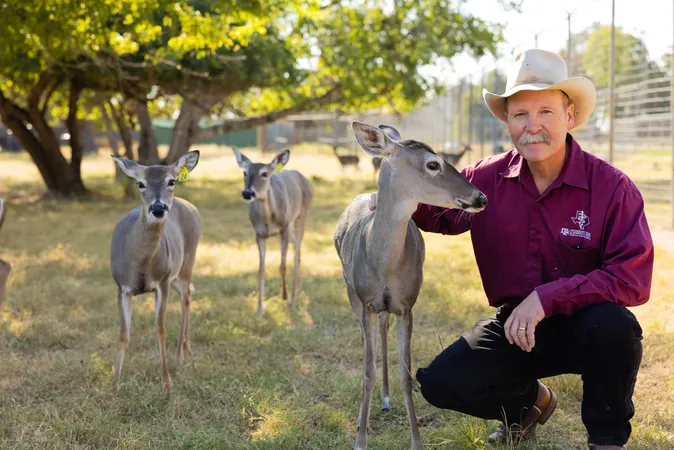
Breakthrough in Oral Anthrax Vaccine for Wildlife: White-Tailed Deer Show Promising Results!
2024-11-05
Author: Charlotte
Breakthrough in Oral Anthrax Vaccine for Wildlife: White-Tailed Deer Show Promising Results!
In an exciting advancement for wildlife health, researchers from the Texas A&M College of Veterinary Medicine and Biomedical Sciences have made significant progress in developing an oral vaccine for anthrax, with successful tests conducted on white-tailed deer. The findings, published in the Journal of Zoo and Wildlife Medicine, could revolutionize the way we prevent anthrax outbreaks in wild populations.
The Threat of Anthrax in Wildlife
Anthrax, a deadly disease caused by the bacterium Bacillus anthracis, poses a serious threat to various mammal species, including livestock and wildlife. Often, ranchers in areas prone to anthrax outbreaks routinely vaccinate their herds; however, administering similar vaccines to wild animals remains a daunting challenge. Dr. Walt Cook, a clinical professor at Texas A&M, emphasized the importance of finding alternative solutions, stating, 'All mammals are susceptible to anthrax to some degree or another. It’s practically impossible to catch every wild animal for vaccination.'
The problem becomes particularly severe in regions like the Edwards Plateau in Central Texas, which saw a staggering spike in anthrax-related deaths in 2019, possibly accounting for the loss of up to 10,000 animals within a mere few months. Wild deer populations are significant contributors to these outbreaks, as the bacteria can remain potent in soil for decades once released from decomposing carcasses.
Environmental Hazard of Anthrax
Dr. Cook notes that anthrax can become a persistent environmental hazard, saying, 'In the right conditions, those spores can remain active in the soil for decades or even hundreds of years. Controlling anthrax spore formation is essential to curbing outbreaks.'
The Quest for an Oral Vaccine
Creating an effective oral vaccine is no simple feat. According to Dr. Jamie Benn Felix, an assistant professor at Texas A&M University-Kingsville's Caesar Kleberg Wildlife Research Institute, anthrax spores have difficulty surviving the digestive tract without special treatment. Felix has been pivotal in this development, having successfully formulated a new oral vaccine through a sophisticated process known as microencapsulation. This technique involves placing the anthrax bacteria within a protective membrane that allows for controlled release, generating a sufficient immune response.
The research team, which includes VTPB professor Dr. Allison Rice-Ficht—who pioneered the encapsulation technique—celebrates this achievement. 'Thanks to our team's hard work, we were finally able to test the new oral vaccine, and our results show that it successfully generated an immune response. That means the encapsulation technique works,' Cook stated.
Looking Forward: Vaccine Delivery Methods
Looking forward, the team is poised to evaluate various methods for delivering the vaccine to wild animals through food baits, a strategy that holds the potential to protect wildlife effectively and mitigate the risk of anthrax outbreaks in natural habitats.
Implications for Wildlife Health and Beyond
This revolutionary approach promises not only to safeguard deer populations but also to preserve ecosystems and reduce the chances of zoonotic diseases spreading to humans. The implications of this research extend beyond mere animal health and could pave the way for innovative veterinary practices worldwide.
Conclusion
Stay tuned for more updates on this groundbreaking project that could change wildlife medicine forever!









 Brasil (PT)
Brasil (PT)
 Canada (EN)
Canada (EN)
 Chile (ES)
Chile (ES)
 España (ES)
España (ES)
 France (FR)
France (FR)
 Hong Kong (EN)
Hong Kong (EN)
 Italia (IT)
Italia (IT)
 日本 (JA)
日本 (JA)
 Magyarország (HU)
Magyarország (HU)
 Norge (NO)
Norge (NO)
 Polska (PL)
Polska (PL)
 Schweiz (DE)
Schweiz (DE)
 Singapore (EN)
Singapore (EN)
 Sverige (SV)
Sverige (SV)
 Suomi (FI)
Suomi (FI)
 Türkiye (TR)
Türkiye (TR)